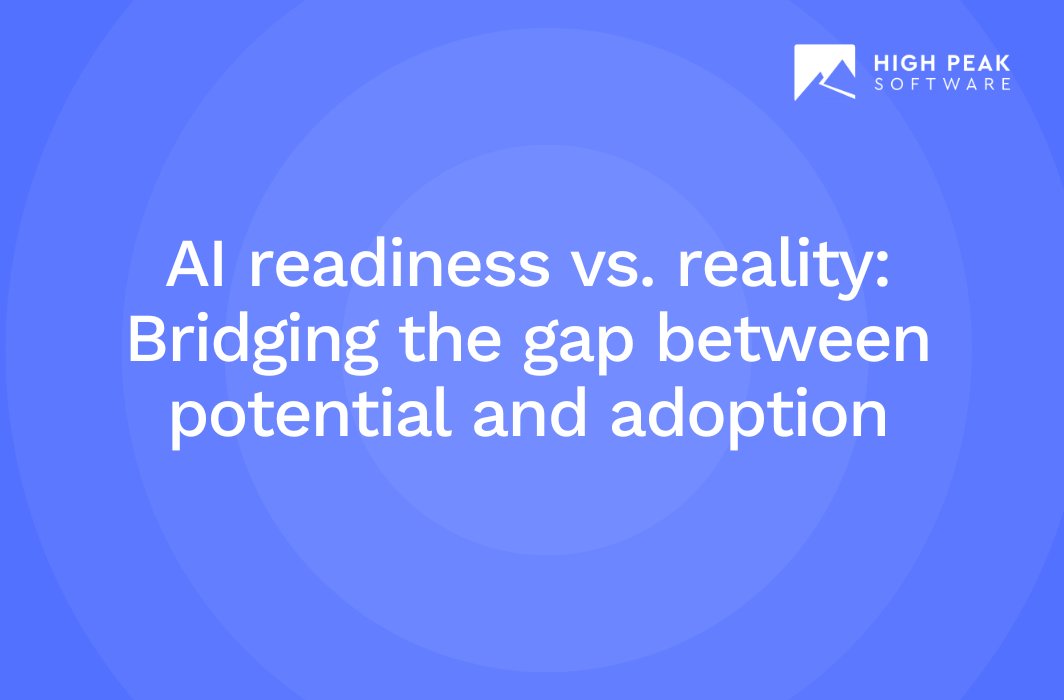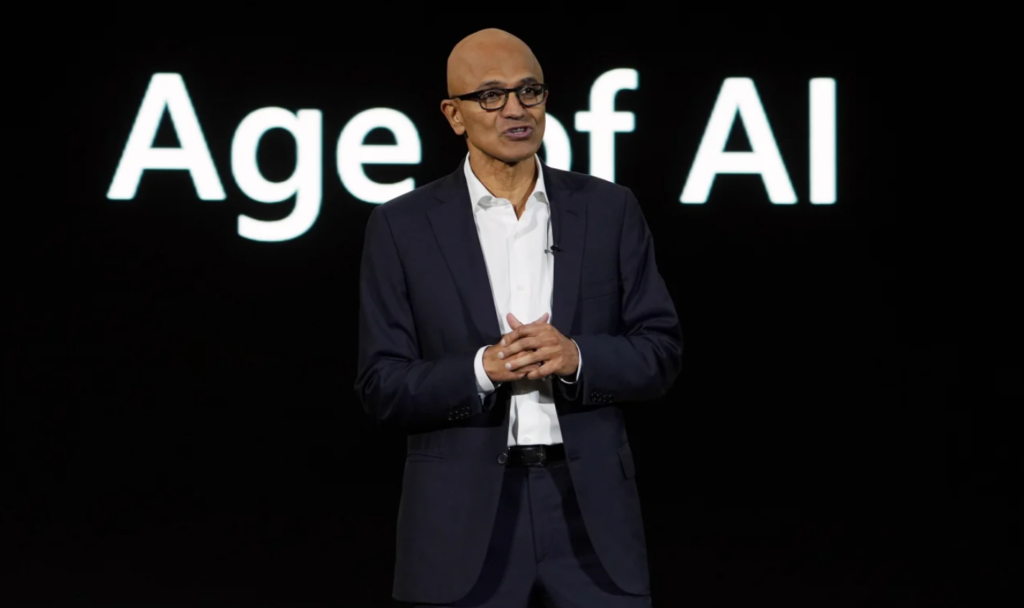AI readiness vs. reality: Bridging the gap between potential and adoption

Table of Contents
- AI took the political stage, but not as predicted
- AI in politics: How algorithms could reshape democracy
- Hong Kong takes bold steps in AI and crypto policy
- OpenAI hits $157 billion valuation with tech giants backing
- Ethical challenges posed by AI in wealth management
- Microsoft’s soaring AI investments in finance
- AI in politics: a growing threat to democratic processes
- CFOs caught off-guard: Only 35% use AI in finance despite 60% readiness claims!
- Surprising shift: Nearly 40% of Americans ditch traditional financial advisors for AI in finance – are you one of them?
- Doctors replaced by robots? UW Health’s shocking AI revelation!
- White House endorses Open AI, sees no immediate need for restrictions
- Keep yourself updated with the latest updates on AI in finance with High Peak
Updated on December 27, 2024
Stay at the forefront of transformation with the latest insights from High Peak, your trusted AI consulting company. Join us as we delve into how artificial intelligence is revolutionizing finance, healthcare, and politics, offering you weekly snapshots of the most impactful developments. At High Peak, we don’t just observe—we actively participate in the AI revolution, ensuring you stay informed and ahead of the curve. Let’s see what the latest in AI is!
AI took the political stage, but not as predicted
The journey of AI in politics this year unfolded in ways that left many surprised, reshaping the dialogue in AI news circles.
Key highlights from this round of AI in politics news:
- Trailblazing AI mayor candidate: In a groundbreaking move, Wyoming introduced VIC, the first AI mayor candidate, highlighting an unprecedented intersection of AI and politics.
- Generative AI’s understated effect: The much-anticipated influence of generative AI on global elections was subtler than expected, challenging the sensational forecasts in AI politics news.
- The deepfake scare subsides: Against predictions, the election season saw minimal deepfake disturbances, a significant point of relief and reflection in AI news analysis.
- AI’s role in political support: Instead of sowing discord, AI found a constructive use in amplifying support for candidates, shifting perceptions in AI in politics discussions.
- AI’s unseen electoral contributions: From crafting speeches to strategic planning, AI’s inconspicuous contributions in the political arena illustrate its evolving narrative in politics news.
- AI’s democratic enhancements: Demonstrating its potential for good, AI aided in making elections more inclusive and efficient, showcasing the positive capabilities of technology in AI in politics insights.
For an in-depth exploration of how AI’s role in the political domain diverged from expectations, while still marking a year of significant impact, read this article here.
AI in politics: How algorithms could reshape democracy
The landscape of AI in politics is undergoing a significant transformation, and a recent article highlights both the potential benefits and risks of this evolution.
Key highlights from this round of AI in politics news:
- AI-aided inclusivity: India’s Prime Minister Narendra Modi uses AI to translate speeches for a multilingual electorate, demonstrating its role in creating more inclusive democracies.
- AI-driven campaigns: South Korean presidential candidates utilize AI avatars to answer voters’ questions simultaneously, showcasing a new trend in AI news.
- Fundraising and polling: AI tools are enhancing fundraising efforts and traditional polling methods, offering cheaper and faster data collection.
- Equitable democracy: Local candidates with fewer resources may rely on AI tools for support, leading to a more equitable political landscape.
- Power dynamics: At the national level, AI tools are likely to amplify the power of already influential campaigns.
- Risks of AI in politics: The promise of AI comes with substantial risks, like scalable automation transforming political advertising into personalized demagoguing.
- Adversarial nature: AI’s involvement in politics invites hacking attempts by opponents, raising concerns about security and manipulation.
- Diverse optimizations: Different parties and ideologies will optimize AI systems for their purposes, leading to varied trust levels and ethical concerns.
This development signifies a profound shift in the role of AI in politics and democratic processes. For additional details and a deeper understanding of AI’s impact on democracy, read this article here.
Hong Kong takes bold steps in AI and crypto policy

Hong Kong is on the brink of pioneering AI in politics with its freshly unveiled AI policy tailored for finance, alongside enticing tax incentives for the crypto sector. These steps highlight the city’s ambition to become a leading Asian business hub.
Key highlights from this round of AI news:
- AI Policy Introduction: The city introduced its inaugural guidelines focusing on AI’s application within the financial sector. This AI policy marks a significant milestone in integrating AI in politics.
- Tax Incentives for Crypto: Proposals to extend tax breaks on digital assets ownership signal a progressive move to attract virtual asset investments.
- Unified Regulatory Framework: A common framework has been outlined to assist various regulatory bodies in developing policies for AI use, showcasing a concerted effort to manage AI’s impact on finance and beyond.
- Legislation Timeline: The promise of enacting legislation by year-end for the proposed tax breaks showcases the government’s commitment to rapidly adopt AI and crypto advancements.
Hong Kong’s recent foray into AI policy and tax breaks for cryptocurrencies is a bold indicator of the city’s aspirations to mold a future where AI in politics plays a critical role. Also, for those seeking further details on this landmark strategy, click here to read the full article.
OpenAI hits $157 billion valuation with tech giants backing
The dynamic arena of AI in finance is bustling as OpenAI achieves a staggering $157 billion valuation, foretelling transformative shifts in AI technologies.
Key highlights from this round of AI news:
- Valuation surge: OpenAI’s valuation increased to $157 billion, marking a significant leap in the AI landscape.
- Major investors: Microsoft, Nvidia, and other tech giants reinforce their commitment, spotlighting a major trend in AI in finance.
- Revenue growth: OpenAI’s revenue reached $300 million last month, signifying its robust market presence.
- Strategic expansions: The funding enables further development in AI tools and compute capacity, crucial for solving complex problems.
- Executive perspectives: OpenAI anticipates raising $11.6 billion next year, showcasing potential growth dynamics in the AI sector.
This development in AI and its implications for financial technologies highlight a pivotal moment in AI in finance news. For those seeking deeper insights and more details, read this article here.
Ethical challenges posed by AI in wealth management
The rapid adoption of AI in finance brings to light several ethical issues that are crucial for the industry. Here are the key highlights from this AI news:
- Ethical questions: The use of AI in finance has raised concerns about transparency, bias, and client confidentiality.
- Expert commentary: Azish Filabi from The American College of Financial Services addressed these issues, emphasizing the need for ethical consideration in AI applications.
- Regulatory updates: New government guidelines are being developed to address the ethical use of AI, which is becoming a critical topic in news about AI.
- Data biases: The risks of data bias in AI systems are affecting trust and decision-making in wealth management, highlighting a major issue in AI in finance news.
For more details on these ethical issues and their implications for the future of finance, read the full article here.
Microsoft’s soaring AI investments in finance
Microsoft is making aggressive leaps in the AI in finance landscape, with substantial finance leases set to bolster its capabilities.
Key highlights from the latest AI news:
- Microsoft’s finance leases surge: The tech giant’s finance lease commitments for data centers, crucial for AI workloads, have peaked at $10.84 billion.
- Sharp increase observed: This figure marks a striking increase of over $100 billion in just two years.
- Long-term vision: These leases, supporting AI in finance innovation, will unfold from fiscal years 2025 to 2030, with agreements extending up to 20 years.
- Capital expenditure boom: Microsoft’s capital expenditures have risen to $19 billion, a number equating to its entire spend in the fiscal year 2020.
- Collaboration with third parties: To accommodate the growing demand for its AI-powered services, Microsoft has entered cloud partnerships enhancing AI in finance services.
This expansion in AI in finance and capital leases signifies a pivotal shift for Microsoft, implying a future of enhanced AI capabilities. To dive deeper into how AI in finance is shaping up and Microsoft’s strategic moves, read this article here.
AI in politics: a growing threat to democratic processes
The use of AI in politics is increasingly a point of contention and concern, as highlighted in recent AI news. New findings reveal the role of advanced AI in spreading customized misinformation, marking a significant moment for democracy and media integrity.
Key highlights from the latest AI in politics news:
- Sophistication and scale of misinformation: Advanced AI models are now tools for creating and spreading targeted political falsehoods, dominating discussions in AI news today.
- Accessibility of manipulative tools: The cost-efficiency of AI technologies enables even minor political entities to launch potent misinformation campaigns. This alarming trend highlights a pivotal time in news about AI in politics.
- Impact of microtargeting: AI-driven strategies now tailor misleading content to influence specific groups, increasing the stakes in AI news coverage on electoral manipulation.
- Threat to voter decisions: The impending risk of AI in politics potentially swaying public opinion and altering election outcomes is a major concern, frequently featured in AI news.
- Call for safeguards: The growing need to implement stricter controls and transparency measures for AI applications in political arenas is urgent, a recurring theme in today’s AI news.
As AI technologies play an increasingly controversial role in political campaigns, it becomes crucial to evaluate their impact on public trust and electoral integrity. For a more detailed exploration of how AI is changing the political landscape, read this article here.
CFOs caught off-guard: Only 35% use AI in finance despite 60% readiness claims!
A recent study found that while 60% of financial chiefs say their companies are ready to use artificial intelligence (AI), only 35% are actually leveraging AI in finance. This discrepancy underscores the significant gap between preparing for AI in finance and actively applying it. Here’s a deeper look:
Key highlights are:
- AI readiness vs. actual usage: While 60% of CFOs state their organizations are primed for AI, the reality is that only a small fraction has integrated AI in finance operations effectively.
- The urgency for AI in finance: The notable uptick in prioritizing business continuity underscores AI’s imperative in fostering adaptable and resilient strategies.
- Survey insights on AI in finance: Results from 150 finance executives reveal a panorama of the industry’s stance on AI. Thus, there is a clear dichotomy between eagerness and execution regarding AI in finance.
- Operational challenges in finance: Despite the buzz around AI, a staggering 84% of finance leaders report being entangled in manual tasks. Thus demonstrating the urgent need for AI in finance.
- Investing in the future of finance: Even with slow adoption rates, there’s a silver lining, as 69% of respondents are keen on exploring. Also, they’re investing in AI and automation for finance.
- A call to action for AI in finance: These findings serve as a wake-up call for CFOs to transition from mere readiness to actual deployment of AI in finance. Thus tapping into its potential for value creation and strategic advantage.
Discover why AI in finance is not fully embraced and what this could mean for the future of the industry by reading the full news and report here.
Surprising shift: Nearly 40% of Americans ditch traditional financial advisors for AI in finance – are you one of them?
In an astonishing shift towards technology, nearly two-fifths of Americans now prefer artificial intelligence for financial guidance, moving away from traditional advisories. This trend marks a defining moment in the intersection of finance and technology.
Key highlights are:
- AI’s ascending role in finance: Approximately 37% of Americans now turn to AI for financial advice. This demonstrates a significant pivot to tech-driven financial strategies.
- Generation Z and AI in finance: Taking the lead, 61% of Gen Z is relying on AI for financial decisions. This sets a clear indicator that AI will be the future norm in finance.
- Diverse applications of AI in finance: A surprising 49% of Americans employ AI to navigate personal finance, from budgeting to investing. This highlights AI’s broad utility in finance.
- Openness to future AI in finance utilization: With 30% more Americans considering AI for their financial planning, the potential for AI’s role looks increasingly promising.
- Efficiency of AI in finance acknowledged: Concerns about AI’s emotional intelligence persist. Nevertheless, the efficiency and accessibility it brings to making informed financial decisions are highly valued.
The survey, sponsored by BMO and including input from over 2,500 U.S. adults, illustrates a pivotal shift and the complex dynamics of integrating AI in personal finance management.
This evolving narrative of AI in our daily lives, particularly in financial advice, is opening new chapters. For insights into this surprising trend and its potential implications on your financial strategies, explore the detailed findings of the Ipsos survey.
Doctors replaced by robots? UW Health’s shocking AI revelation!
In an era where technology intersects with healthcare, the roundtable UW AI report marks a pivotal moment for innovation. This document encapsulates the insights and forward-thinking strategies discussed by leaders across the health sector. It focuses on the integration and ethical implementation of artificial intelligence within medical systems.
Key highlights are:
- AI in healthcare – administrative relief: UW Health is leveraging AI in healthcare to alleviate the administrative workload faced by healthcare providers. The technology aids in drafting communications and transcribing medical notes, enhancing overall efficiency.
- Enhanced care through AI: The adoption of AI in healthcare settings empowers physicians at UW Health. Frank Liao highlights that AI’s support in clerical tasks enables doctors to dedicate more time to hands-on patient care.
- AI’s role in patient safety: Within UW Health, AI plays a crucial role by assisting with diligent documentation practices. This contributes to patient safety through the timely updating of medical records.
- Support in critical decisions: Predictions for the future of AI in healthcare suggest that it will progress to providing critical decision support during emergencies. It swiftly collates key patient information, thus revolutionizing urgent care practice.
Curious about how AI is transforming your healthcare experience? Dive deeper into the advancements and real-time applications at UW Health by reading the full article here!
White House endorses Open AI, sees no immediate need for restrictions
In a significant political move, the White House has voiced its support for open-source artificial intelligence (AI), signaling a pivotal moment for AI in politics. Here’s the essence of this groundbreaking development.
Key highlights are:
- Embracing Open AI in politics: Showcasing a forward-thinking approach, the U.S. government’s endorsement of open-source AI reflects a strategic political decision. Thus underscoring the belief that premature restrictions should not hamper innovation.
- Political leadership and AI: Spearheaded by insights from Alan Davidson of the U.S. Commerce Department, the decision highlights a key political viewpoint on the integral role of open systems in pioneering AI technology advancements.
- Evaluating risks and rewards: The stance is rooted in an executive directive from President Biden, which mandates a comprehensive analysis. Thus, this reflects a high level of political engagement with the potential and perils of AI in politics and society.
- A political balancing act: Amid growing safety concerns regarding AI, the report offers a nuanced political discourse. It focuses on maintaining a healthy ecosystem for open AI innovation while being vigilant about safety and ethical use.
- Proactive political stance: Signaling political readiness, the U.S. administration is actively assessing AI’s evolving landscape. It is prepared to implement protective measures aligning with national and international safety standards.
- AI in political dialogue: The context of U.S. presidential elections further intensifies the relevance of this move in the political arena. Political endorsements and debates about open AI, such as those from Sen. JD Vance, emphasize the essential role of AI in politics. Thus, they advocate against stringent regulations that could stifle technological growth and competition.
Dive deeper into this politically charged endorsement and what it means for the future of tech. Read the full article on ABC News for comprehensive insights!
Keep yourself updated with the latest updates on AI in finance with High Peak
For those inspired to integrate similar AI capabilities into their systems or explore tailored AI solutions, be sure to check out our news section for the latest insights and updates.
Book a consultation with our experts today and unlock the potential of cutting-edge AI technologies tailored specifically to your needs.









